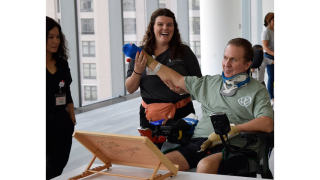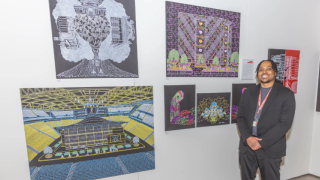Body
The term "augmentative" means "in addition to"; the term "alternative" means "instead of.” Communicating with AAC involves any method of communication that is used in addition to or instead of speech. These forms include gestures, facial expression, body language, and written words. Everyone, even those who speak, uses different forms of AAC every day. Examples of communicating without speaking include: passing a note in class; waving to a friend who is across the room; pointing to words on the menu at a restaurant; or smiling while opening a gift.
Sometimes when people are unable to speak, common forms of AAC may not be powerful enough to meet all communication needs. In these cases, a communication board, book, device, or computer system may be needed to help communicate specific messages.
AAC can be useful at any age. Very young children who cannot speak need a means of sharing their wants, needs, and ideas, and a way to communicate while playing with their friends and working at school. AAC can also support overall language development . Adults or older children who have lost the ability to speak because of injury or other medical condition can use AAC to communicate with family members, medical staff, therapists, and people in the community. Without a clear means of communicating, many individuals feel frustrated and alone. Augmentative communication can be the link to self-expression.
The use of AAC does not keep speech from developing or returning. In fact, AAC may increase motivation to communicate and encourage attempts at vocalizing and speaking. Since speech is the fastest and most efficient means of communicating, most individuals will not rely on AAC unless needed. At the same time, they may continue to receive speech therapy to work on improving communication.
Speech-language pathologists carefully look at abilities and needs in order to recommend an appropriate type of AAC. There are many specific types of AAC strategies and devices. Selection depends on the individual circumstances. Consult a speech-language pathologist for further information about AAC selection and training.
This listing will contain several key organizations that can assist an individual to obtain knowledge and supportive information about augmentative and alternative communication (AAC) devices for themselves or others who would benefit from alternative modes of communication.
Augmentative and Alternative Communication (AAC)
The University of Nebraska has compiled a resource list, which includes AAC Blogs, important Websites, AAC recommended books, terminology and vocabulary associated with augmentative communication.
Department of Special Education and Related Links Communication Disorders
301 Barkley Memorial Center
PO Box 830738
Lincoln, NE 68583-0738
402-472-2145
https://cehs.unl.edu/aac/
ASHA Augmentative and Alternative
The American Speech-Language-Hearing Association (ASHA) provides information and resource links to people with severe speech or language problems that may need AAC to help them communicate. Some may use it all of the time. Others may say some words but use AAC for longer sentences or with people they don’t know well. AAC can help in school, at work, and when talking with friends and family.
800-638-8255
https://www.asha.org/public/speech/disorders/aac/
AAC Institute
The AAC Institute provides support and knowledge about what AAC is, Why individuals use AAC and what type of individuals benefit from their use. Link to their website to learn more about their programs that provide device demonstration, reutilization programs, device loan programs and state financing programs that are available.
1100 Washington Avenue
Suite 317
Carnegie, PA 15106
412-489-5527
email: scarney@aacinstitute.org
https://aacinstitute.org/
The Association of Assistive Technology Act Programs (ATAP)
The Association of Assistive Technology Act Programs (ATAP) is a national, member-based non-profit organization, comprised of state Assistive Technology Act Programs funded under the Assistive Technology Act (AT Act). ATAP facilitates the coordination of state AT Programs nationally and provides technical assistance and support to its members. Established in 1997, the organization strives to enhance the effectiveness of AT Programs on the national, state, and local level. ATAP promotes the national network of AT Programs, represents the needs and interests of the programs, and serves as the national representative of state AT programs.
No phone number provided
https://www.at3center.net/home
Infinitec - Infinite Potential through Technology
The assistive technology program of UCP Seguin of Greater Chicago. The program leverages the power of technology to advance independence and promote inclusive opportunities for children and adults with disabilities.
7550 West 183rd Street
Tinley Park, Illinois 60477
(708) 444-8460
International Society for Augmentative and Alternative Communication ISAAC
The International Society for Augmentative and Alternative Communication (ISAAC) works to improve the lives of children and adults who use AAC. ISAAC’s vision is that AAC will be recognized, valued and used throughout the world. ISAAC’s mission is to promote the best possible communication for people with complex communication needs.
312 Dolomite Drive, Suite 216
Toronto, Ontario
M3J 2N2 Canada
905-850-6848
https://www.isaac-online.org/english/home/
RESNA, the Rehabilitation Engineering and Assistive Technology Society of North America, is the premier professional organization dedicated to promoting the health and well-being of people with disabilities through increasing access to technology solutions. RESNA advances the field by offering certification, continuing education, and professional development; developing assistive technology standards; promoting research and public policy; and sponsoring forums for the exchange of information and ideas to meet the needs of our multidisciplinary constituency. RESNA is a 501 (c) 3 not-for-profit membership association. The below html link provides the consumer with locations across the United States
2025 M Street NW
Suite 800
Washington, DC 20036
PHONE: (202) 367-1121
FAX: (202) 367-2121
https://www.resna.org/About
Technology Center Shirley Ryan AbilityLab
Shirley Ryan AbilityLab’s Assistive Technology Program offers a variety of services to enhance your independence, comfort and quality of life. At the AbilityLab, you have access to experts who can assist you with state-of-the-art devices, technology (software and hardware), assistive robots and other adaptive technology and equipment. Augmentative and alternative communication devices help you express yourself if you have difficulty speaking. They range in complexity from low-tech tools, such as a manual communication board that allows you to point to letters or pictures to high-tech, voice-generating computers that speak aloud what you input.
355 East Superior Street, 19th Floor
Chicago, Illinois 60611
1-800-354-7342
https://www.sralab.org/services/assistive-technology
This content is for informational purposes only and may not be comprehensive. Information contained does not imply an endorsement from Shirley Ryan AbilityLab, and does not replace the advice of a qualified healthcare professional. See here for further details.
© Shirley Ryan AbilityLab (formerly Rehabilitation Institute of Chicago)
Henry B. Betts LIFE Center – (312) 238-5433



